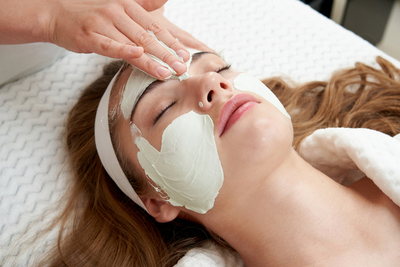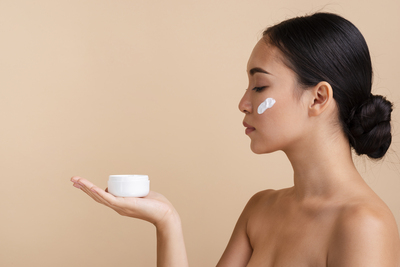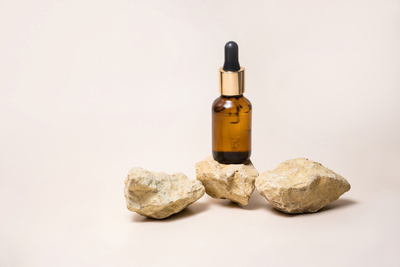Face Acids Types That Help And Ones To Avoid

Our skin is constantly influenced by the external environment and health problems. As a result, it may suffer from inflammation, uneven tone and first signs of aging. In such cases, acids will be amazing helpers for your skin.
They do an excellent job in fighting acne, lightening age spots and normalizing the regeneration processes. No doubt, they are gaining more popularity as their effects are obvious. In this skincare acids guide, we study the types of acids and their main functions. Find those that suit your skin type and remember: on SkinBuddy, the process of selecting products will take just a couple of clicks.
Now, let’s get skincare acids explained.
Main Types Of Skincare Acids
AHAs are water-soluble and work on the surface of the skin. This makes them a good option for reducing wrinkles and dullness and smoothing texture. They are mainly used for hydration and protection.
These acids remove unevenness, improve the production of collagen, make the skin more elastic and firm, and make post-acne marks less noticeable.
Also, these acids prevent pores from becoming clogged, fight the symptoms of photoaging, and exfoliate dead cells. The most popular AHAs are glycolic, lactic and mandelic.
BHAs, on the other hand, can dissolve in water. They penetrate clogged pores and therefore, help in fighting acne. When the epidermis of the skin exfoliates, the pore-clogging sebum goes along with it.
BHAs remove blackheads, fight inflammatory processes, and clogged pores. These substances treat breakouts and prevent the formation of new ones, and have exfoliating properties.
The main BHA is salicylic acid. It dissolves sebaceous plugs and helps narrow the pores. With regular use, products with BHA have a sebum-regulating effect, make the skin more matte and reduce the number of imperfections.
List Of Acids For Skin
Glycolic Acid
Glycolic acid penetrates deeply into the skin, making it one of the most effective acids ever. It restores collagen and evens out skin tone. But there's a catch to its amazing results. Since it leads to more intense exfoliation, glycolic acid has a greater chance of causing irritation. It removes dead skin cells and regulates the production of sebum.
Lactic Acid
Lactic acid skin care benefits are mostly about its hydrating properties. This acid is gentler than glycolic one and attracts moisture to the skin, making it a hydrating agent. It is suitable for those with sensitive skin. Lactic acid makes the skin smooth and gives it an even, healthy tone.
Mandelic Acid
It's an exfoliant similar to glycolic acid that can be used to treat sun damage, prevent acne, and fight pigmentation. It often replaces glycolic acid in peelings.
Salicylic Acid
Salicylic acid is one of the most popular ingredients for minimizing breakouts. It dissolves oil that clogs pores and also exfoliates dead skin cells. Moreover, it acts without irritating already inflamed skin. This acid is a holy grail if you have acne-prone skin.
Hyaluronic Acid
What are the key hyaluronic acid skin care benefits? This acid is best known for its hydrating properties. It helps retain moisture on the surface of the skin and prevents the appearance of wrinkles. It also stimulates collagen production.
Azelaic Acid
Azelaic acid is a multi-functional skin care ingredient. It gently exfoliates, penetrating deep into pores to remove dead skin cells. Moreover, it fights acne and reduces inflammation. Azelaic acid is an excellent remedy in the fight against hyperpigmentation.
Which Acid Is Best For My Skin?
- Best for acne-prone skin: azelaic acid, salicylic acid, glycolic acid, lactic acid, mandelic acid;
- Best for mature skin: glycolic acid, lactic acid, hyaluronic acid;
- Best for skin with pigmentation: azelaic acid, glycolic acid, lactic acid.
Try SkinBuddy to find out what works for your skin, and what doesn’t.
Scan your skincare, avoid pore-clogging or irritating ingredients, and discover smarter product matches. Open the web app or download the mobile app to get started.
or
Check Products OnlineCheck if your skincare suits your skin type, sensitivity, or acne-prone needs at skinbuddy.app and discover better options that match your routine and goals. SkinBuddy makes it easy, fast, and science-backed.
Scan to get started:

Web App (mobile only)

App Store & Google Play
Acids In Your Daily Skin Care
Acids can be found not only in peelings, but also in:
- Serums. These products have a cumulative effect;
- Tonics. The combination of acid molecules and tonics creates a combo that cleanses the skin of dead cells and promotes the absorption of active ingredients;
- Face masks. In combination with vitamins and oils, acids act as a substance that increases their effectiveness.
How To Use Acids?
First of all, test the formula of different skincare acids on the inside of your arm and wait 24 to 48 hours to see if you have a reaction. If everything is fine, try applying the acid to your face. Although a slight tingling sensation isn’t a major concern, any painful burning sensation is a serious warning.
Start getting acquainted with acids gradually. Use them once a week and watch your skin's reaction.
When to use acids in skin care routine? You can rely on them both in the morning and at night, but don’t use acids at the same time as retinol. Both components increase skin sensitivity, so it is better to alternate products with these substances.
Don't forget to apply SPF, especially if you use products with acids in the morning. Even if acids are just part of your nightly routine, your skin will still be extremely sensitive the next morning, so sun protection should be essential.
To Wrap It Up
Different acids for skin care are a must-have for many reasons. They delicately exfoliate and even out tone, provide intense cleansing, help fight imperfections and reduce the appearance of wrinkles. With regular use of acids in skincare routine, the skin looks more hydrated, smooth and soft.
References
- Facial Acids: Know What You Need in Your Skin Care Routine. Cleveland Clinic. https://health.clevelandclinic.org/guide-to-facial-acids
- All About the Helpful Acids in Skin Care. Skin Doctors Cosmeceuticals. https://skindoctors.com.au/articles/all-about-the-helpful-acids-in-skin-care
- Best Acids For Chemical Exfoliation According To A Dermatologist. Dr. Rashmi Shetty. https://drrashmishetty.com/the-best-acids-for-chemical-exfoliation-according-to-a-dermatologist
- A Comprehensive Guide to Using Acids in Your Skin-Care Routine. Everyday Health. https://www.everydayhealth.com/skin-beauty/a-comprehensive-guide-to-using-acids-in-your-skin-care-routine







